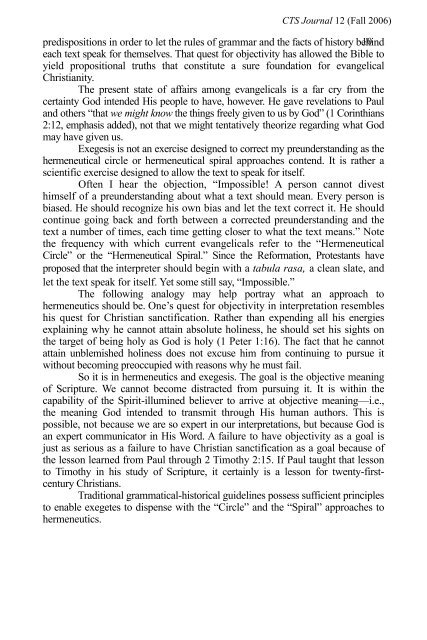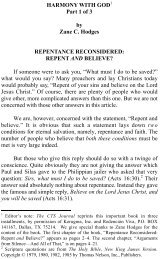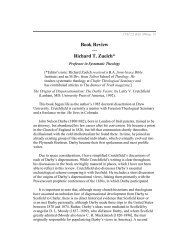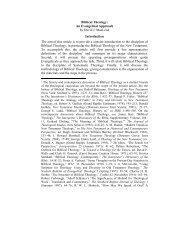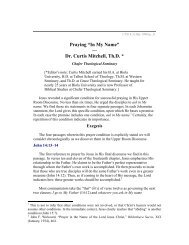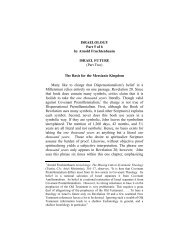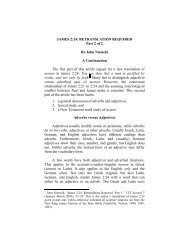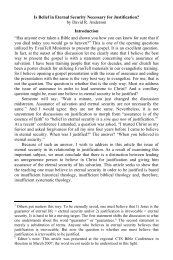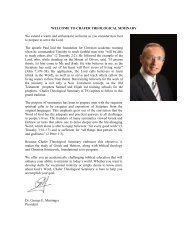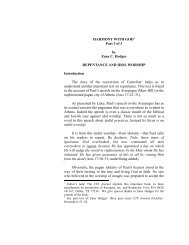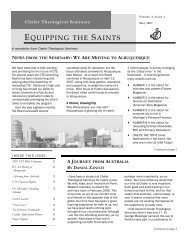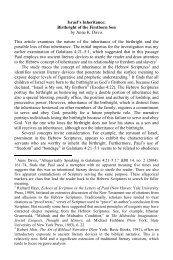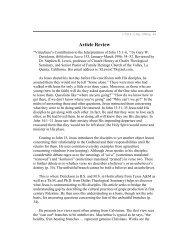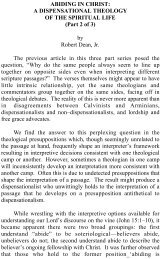BIBLICAL HERMENEUTICS - Chafer Theological Seminary
BIBLICAL HERMENEUTICS - Chafer Theological Seminary
BIBLICAL HERMENEUTICS - Chafer Theological Seminary
Create successful ePaper yourself
Turn your PDF publications into a flip-book with our unique Google optimized e-Paper software.
CTS Journal 12 (Fall 2006)<br />
predispositions in order to let the rules of grammar and the facts of history behind 10<br />
each text speak for themselves. That quest for objectivity has allowed the Bible to<br />
yield propositional truths that constitute a sure foundation for evangelical<br />
Christianity.<br />
The present state of affairs among evangelicals is a far cry from the<br />
certainty God intended His people to have, however. He gave revelations to Paul<br />
and others “that we might know the things freely given to us by God” (1 Corinthians<br />
2:12, emphasis added), not that we might tentatively theorize regarding what God<br />
may have given us.<br />
Exegesis is not an exercise designed to correct my preunderstanding as the<br />
hermeneutical circle or hermeneutical spiral approaches contend. It is rather a<br />
scientific exercise designed to allow the text to speak for itself.<br />
Often I hear the objection, “Impossible! A person cannot divest<br />
himself of a preunderstanding about what a text should mean. Every person is<br />
biased. He should recognize his own bias and let the text correct it. He should<br />
continue going back and forth between a corrected preunderstanding and the<br />
text a number of times, each time getting closer to what the text means.” Note<br />
the frequency with which current evangelicals refer to the “Hermeneutical<br />
Circle” or the “Hermeneutical Spiral.” Since the Reformation, Protestants have<br />
proposed that the interpreter should begin with a tabula rasa, a clean slate, and<br />
let the text speak for itself. Yet some still say, “Impossible.”<br />
The following analogy may help portray what an approach to<br />
hermeneutics should be. One’s quest for objectivity in interpretation resembles<br />
his quest for Christian sanctification. Rather than expending all his energies<br />
explaining why he cannot attain absolute holiness, he should set his sights on<br />
the target of being holy as God is holy (1 Peter 1:16). The fact that he cannot<br />
attain unblemished holiness does not excuse him from continuing to pursue it<br />
without becoming preoccupied with reasons why he must fail.<br />
So it is in hermeneutics and exegesis. The goal is the objective meaning<br />
of Scripture. We cannot become distracted from pursuing it. It is within the<br />
capability of the Spirit-illumined believer to arrive at objective meaning—i.e.,<br />
the meaning God intended to transmit through His human authors. This is<br />
possible, not because we are so expert in our interpretations, but because God is<br />
an expert communicator in His Word. A failure to have objectivity as a goal is<br />
just as serious as a failure to have Christian sanctification as a goal because of<br />
the lesson learned from Paul through 2 Timothy 2:15. If Paul taught that lesson<br />
to Timothy in his study of Scripture, it certainly is a lesson for twenty-firstcentury<br />
Christians.<br />
Traditional grammatical-historical guidelines possess sufficient principles<br />
to enable exegetes to dispense with the “Circle” and the “Spiral” approaches to<br />
hermeneutics.


